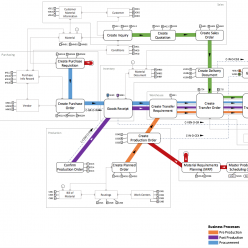In today’s competitive landscape, all large enterprise organizations operate with the help of enterprise systems, in particular, ERP systems. These systems add a huge value to these organizations to the point where the business would be unable to run with out them. They have become a vital part of running a business. Utilizing these systems can be extremely complex and require people with highly specific knowledge to run and maintain these systems. Due to their importance to daily operations, these enterprise systems are complex and come with their own inherent benefits, challenges and risks.
Benefits
The benefits of utilizing an ERP system are vast. Using these systems companies are able to track and manage complex and data heavy business processes that they would be unable to manage without an ERP system. The amount of transactions that are recorded on a day to day basis would be not be feasible to track manually. ERP systems have the benefit of saving companies money by aggregating software for different but interconnected business processes. ERP systems can also simplify the accounting process both internally and for reporting to ensure that an organization is in compliance with the regulatory bodies in which they operate. ERP systems can help standardize a business process with an organization. This has the effect of eliminating waste and increasing efficiency within various business processes and units. The streamlining of workflow and business process alone is enough of to make an investment in an ERP system worth it. The importance of these systems is so great that companies will spend in the millions of dollars on ERP software, implementations, and maintenance to make sure their ERP systems are current.
Challenges
ERP systems also have their fair share of challenges. The most obvious is the large financial investment a company must make to implement one of these systems. However, we have discusses why an ERP systems will almost always have a positive ROI. The real challenge with ERP systems is their implementation into an existing IT environment, or in some cases as the framework for the rest of the businesses critical applications. Implementation can be very tricky for a number of reasons. First, ERP systems are extremely complicated by nature, so implementing them takes cooperation by both the implementation partner and the organization. It is difficult to ensure that the business process is adequately covered by the ERP system. Another challenge in implementing ERP systems in organizations is customization to fir business specific requirements not covered by the standard scope. Customization is almost always necessary for organizations to realize the full benefit of utilizing an ERP system. If an implementation is botched it could have critical damage to a business’ operations and it not easily undone. The final critical challenge in an ERP system is maintaining it. Before the arrival of ERP systems as SaaS, maintaining and updating the system was costly due to the high levels of customization.
Risks
Choosing the right vendor from the start can be critical. The complexity of these systems and their importance to daily business operations makes it difficult and impractical to switch ERP providers. Choosing an ERP system that isn’t considered a Tier 1 provider like SAP can be a huge risk to an organization. If the provider goes under, or the system becomes so dated that it is no longer functional an organization becomes exposed to large financial risks. These financial risks can be substantial and the IT resources a business uses could be at risk of collapse if not supported by the ERP systems. There is also large risk of faulty implementation as covered in the previous section. In recent years companies now face the decision of weather or not to migrate from traditional on-premise ERP software applications to their cloud equivalents. These companies who are thinking of migrating stand to take on the risk of data vulnerability since their data would be hosted outside of the organizations IT environment.
Despite their challenges and risks, the benefits of an ERP system make them a critical part of business operation for almost every business. ERP systems have become an integral part an organizations strategy and operations. Employing people to deal with these challenges and risks helps minimize the risk of implementing ERP systems. And surely, the future will pose new benefits, challenges, and risks as these systems evolve.
